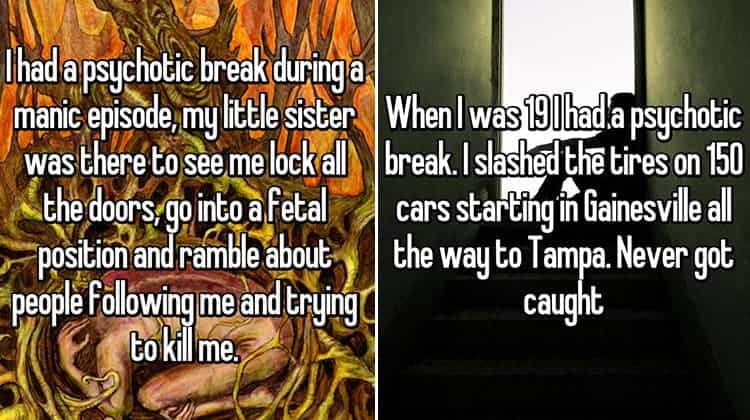

Schizotypal personality disorder can cause you to experience delusions and speak in a bizarre manner.It differs from schizophrenia in that the symptoms will last a minimum of one month, but less than six months. Schizophreniform disorder is similar to schizophrenia in that it can cause you to experience delusions, hallucinations, bizarre speech, odd behavior, or negative symptoms.Schizophrenia is a serious mental illness that can cause symptoms to occur in episodes, or last for an extended period of time. Schizophrenia is a disorder that typically involves delusions, hallucinations, negative symptoms, bizarre behavior, and/or disorganized speech.However, psychotic symptoms and episodes of mania or depression do not happen at the same time. Schizoaffective disorder causes you to experience both psychotic symptoms and symptoms that resemble bipolar disorder.Depression can cause feelings of sadness and other mood changes, though this disorder is also capable of eliciting episodes of psychosis.Delusional disorder is present if you are experiencing one or more types of delusions for one month or longer.Brief psychotic disorder is an appropriate diagnosis if you experience the sudden onset of delusions, hallucinations, disorganized speech, or odd behavior that lasts for at least one day, but for less than a month at a time.Both depression and mania have the potential to trigger the onset of psychosis. Bipolar disorder involves episodes of depression and at least one episode of mania.Therefore, if you are battling episodes of psychosis, you may be struggling with one of the following illnesses: Mental health disorders: Psychosis is a symptom of certain mental health disorders. Additionally, experiencing a great deal of stress or having prenatal exposure to disease can also make you more susceptible to suffering from psychosis. If you have a family history of disorders that can cause psychosis, you may be at risk for experiencing similar challenges.Įnvironmental: When you abuse illicit substances or take certain medications, you may be at risk for experiencing a psychotic episode. Genetic: Many mental health disorders are known to run in families. There are many potential causes and risk factors that can make you vulnerable to experiencing episodes of psychosis. Thankfully, there are many treatment options available that can help you manage psychotic symptoms and live a more satisfying life. When this is the case, you may require specialized services to alleviate your distress. Negative symptoms can signify that you are suffering from an untreated mental health disorder. Some people who experience negative symptoms may also sit for a long period of time or lose interest in social activities. For example, your ability to express emotion, make eye contact, speak, or move to complete a task may become limited. Negative symptoms include abilities that seemingly disappear.

These symptoms can be extremely distressing, especially when the individual believes that the hallucination involves something that he or she believes could cause harm. Hallucinations occur when someone sees, hears, smells, or tastes things that are not actually there. When this symptom of psychosis is present, your communication skills can significantly decrease. There are also instances where people have delusions to the extent that they believe their minds are being controlled by outside entities.ĭisorganized thinking or speech can manifest in jumbled or incoherent thoughts or words. Nihilistic delusions – feeling like a severe catastrophe is destined to happen.Somatic delusions – thinking that something is wrong with your health or that your organs are not functioning properly.Erotomatic delusions – believing that someone else is in love with you.



 0 kommentar(er)
0 kommentar(er)
